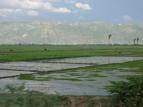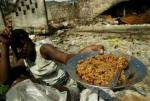 Last week, Haitian survivors of a brutal 1994 massacre by paramilitary leaders at last received a measure of justice. Unfortunately, it wasn't a Haitian court that dispensed it. It was a federal court in Florida. The Raboteau Massacre was a joint military/paramilitary attack on a pro-democracy neighborhood in a seaside slum during Haiti's 1991-1994 de facto military leadership, carried out on April 22, 1994. Up to 100 people were slaughtered, many of them as they ran toward the sea to escape. The next day, survivors of the attack filed complaints in Haiti with a local judge. In 2000, they won the convictions of 53 paramilitary leaders, some of them in absentia, and a damages award of $1 million gourdes. The trial was praised by international observers as fair to victims and defendants alike, and was one of the most important human rights trials ever in the Western Hemisphere.
Last week, Haitian survivors of a brutal 1994 massacre by paramilitary leaders at last received a measure of justice. Unfortunately, it wasn't a Haitian court that dispensed it. It was a federal court in Florida. The Raboteau Massacre was a joint military/paramilitary attack on a pro-democracy neighborhood in a seaside slum during Haiti's 1991-1994 de facto military leadership, carried out on April 22, 1994. Up to 100 people were slaughtered, many of them as they ran toward the sea to escape. The next day, survivors of the attack filed complaints in Haiti with a local judge. In 2000, they won the convictions of 53 paramilitary leaders, some of them in absentia, and a damages award of $1 million gourdes. The trial was praised by international observers as fair to victims and defendants alike, and was one of the most important human rights trials ever in the Western Hemisphere.
 Last week Bourik (BOS) found some feed he best not munch on, chrysopogon zizanioides. This plant, although not nearly as hefty as the volume of mangos exported from Haiti, estimated to be well over 4,500,000 pounds annually is still a lucrative crop.
Last week Bourik (BOS) found some feed he best not munch on, chrysopogon zizanioides. This plant, although not nearly as hefty as the volume of mangos exported from Haiti, estimated to be well over 4,500,000 pounds annually is still a lucrative crop.










